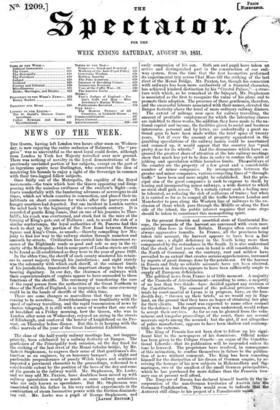The close of the half-yearly railway meetings has, not inappro-
priately, been celebrated by a railway festivity at Bangor. The gentlemen of the Principality took occasion, on the day fixed for the striking of the last rivet of the Menai tubular bridge, by Mr. Robert Stephenson, to express their sense of that gentleman's dis- tinction as an engineer, by an honorary banquet. A. slight and pardonable preponderance of purely Welsh topics and sentiment imparted a provincial character to the proceedings, redeemed to a considerable extent by the position of the hero of the day and some of the guests in the railway world. Mr. Stephenson, Mr. Locke, and we may add Mr. Paxton, have doubtless been mixed up with railway speculation nearly as much as some railway notorieties who are only known as speculators. But Mr. Stephenson was associated with his father in his very earliest experiments in the combination of steam locomotive power with the friction-diminish- ing 'rail. Mr. Locke was a pupil of George Stephenson, and
early companion of his son. Both son and pupil have taken an active and distinguished part in the construction of our rail- way system, from the time that the first locomotive performed its experimental trip across Chat Moss till the striking of the last rivet of the Menai Bridge. Mr. Paxton, too, though his connexion with railways has been more exclusively of a financial character, has achieved kindred distinction by his "Crystal Palace,"—a struc- ture with which, as he remarked at the banquet, Mr. Stephenson is associated as the first to recognize the value of his plans and to promote their adoption. The presence of these gentlemen, therefore, and the successful labours associated with their names, elevated the Bangor festivity above the level of mere ordinary railway dinners.
The extent of mileage now open for railway travelling, the amount of profitable employment for which the labouring classes are indebted to these works, the addition they have made to the na- tional capital and income, the facilities given to social and business intercourse, personal and by letter, are undoubtedly a great na- tional gain to have been made within the brief space of twenty years. Yet if ever the amount of property squandered in the gambling speculations of the railway mania could be ascertained and summed up, it would appear that the country has "paid pretty dear for its whistle." And the discussions which have en- grossed the greatest share of attention at the late railway meetings show that much has yet to be done in order to confine the spirit of jobbing and speculation within harmless limits. These-ail ways of the country are the property of a few great and a considerable number of minor companies. By arrangements between the greater and minor companies, various competing lines of " through- traffic" have been and more might be established. But the prin- cipal aim of the great companies is each to engross to itself, by leasing and incorporating minor railways, a wide district to which no rival shall gain access. To a certain extent such a feeling may be tolerated, as reducing the risk of collisions of trains but when it is carried so far as to compel all the traffic between London and Manchester to pass along the Western line of railways to the ex- clusion of those which pass through the Middle or along the East side of the island, the public interest requires that some steps should be taken to counteract this monopolizing spirit.


























